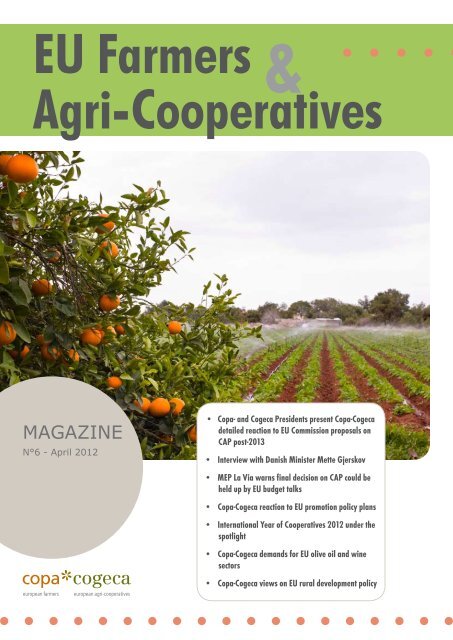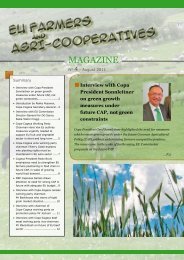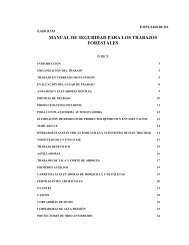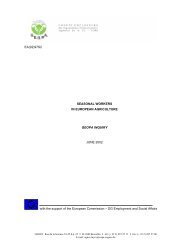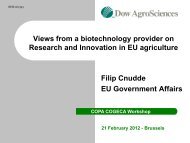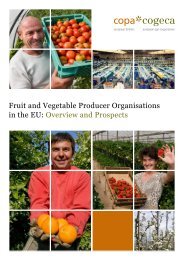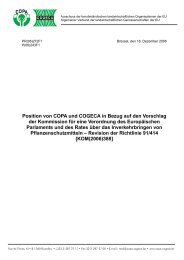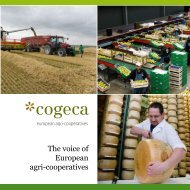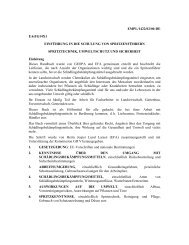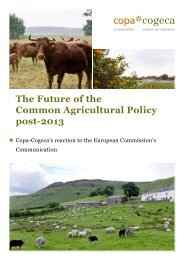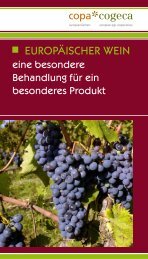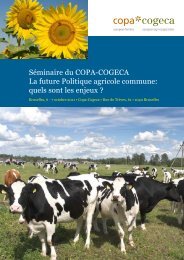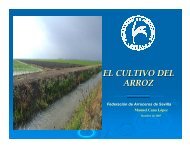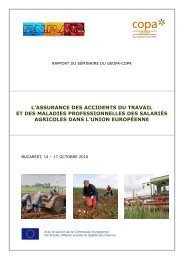MAGAZINE - Copa-Cogeca
MAGAZINE - Copa-Cogeca
MAGAZINE - Copa-Cogeca
You also want an ePaper? Increase the reach of your titles
YUMPU automatically turns print PDFs into web optimized ePapers that Google loves.
EU Farmers &<br />
Agri-Cooperatives<br />
<strong>MAGAZINE</strong><br />
N°6 - April 2012<br />
• <strong>Copa</strong>- and <strong>Cogeca</strong> Presidents present <strong>Copa</strong>-<strong>Cogeca</strong><br />
detailed reaction to EU Commission proposals on<br />
CAP post-2013<br />
• Interview with Danish Minister Mette Gjerskov<br />
• MEP La Via warns final decision on CAP could be<br />
held up by EU budget talks<br />
• <strong>Copa</strong>-<strong>Cogeca</strong> reaction to EU promotion policy plans<br />
• International Year of Cooperatives 2012 under the<br />
spotlight<br />
• <strong>Copa</strong>-<strong>Cogeca</strong> demands for EU olive oil and wine<br />
sectors<br />
• <strong>Copa</strong>-<strong>Cogeca</strong> views on EU rural development policy
2 │ April 2012<br />
CONTENTS<br />
• <strong>Copa</strong>-<strong>Cogeca</strong> Secretary-General talks on EU<br />
Trade Policy................................................. 3<br />
• <strong>Copa</strong> President Gerd Sonnleitner presents<br />
new <strong>Copa</strong>-<strong>Cogeca</strong> detailed reaction to EU<br />
commission proposals on CAP post-2013,<br />
highlighting measures to ensure food<br />
security, productivity, sustainable growth<br />
and employment........................................ 4<br />
• Chairman of <strong>Copa</strong>-<strong>Cogeca</strong> working party on<br />
promotion policy Mr Jochum Broadly<br />
welcomes new EU commission plans on<br />
future promotion policy and highlights need<br />
for good budget.......................................... 5<br />
• MEP LA VIA warns final decision on CAP<br />
could be held up by EU budget talks........... 6<br />
• <strong>Copa</strong>-<strong>Cogeca</strong> welcomes Ciolos move to<br />
create high level group on wine planting<br />
rights but warns it must not delay proposals<br />
to keep planting rights in sector ................ 7<br />
• Euro Coop highlights benefits of principles<br />
of good practice in food chain and events<br />
scheduled for international year of<br />
cooperatives............................................... 8<br />
• Many aspects of future EU rural<br />
development policy proposals welcomed<br />
but serious concerns over IFA review, Peter<br />
Pascher chairman of commission advisory<br />
group “rural development” stresses........... 9<br />
• Falkenberg claims currently looking into<br />
applying at international level same high EU<br />
production and environmental standards to<br />
imports and stepping up controls............. 11<br />
• Interview with Danish Agriculture Minister<br />
Mette Gjerskov on greening and the EU<br />
Commissions' future Common Agriculture<br />
Policy (CAP) proposals.............................. 12<br />
• In International Year of Cooperatives 2012,<br />
<strong>Cogeca</strong> President Paolo Bruni highlights<br />
crucial role cooperatives play in market<br />
place and outlines events for 2012 .......... 15<br />
• <strong>Copa</strong>-<strong>Cogeca</strong> calls for private storage aid for<br />
olive oil to be opened and for long-term<br />
strategic plan for sector............................ 16
April 2012 │ 3<br />
<strong>Copa</strong>-<strong>Cogeca</strong> Secretary-General<br />
Pekka Pesonen<br />
talks on EU Trade Policy<br />
Negotiations are also continuing between the EU and India<br />
for a Free Trade Agreement (FTA). Such an agreement would<br />
benefit the EU dairy, poultry, cereals and oils sectors but we have<br />
defensive interests on rice (in the EU we produce only 65% of<br />
the rice we consume and we import around 1.3 million tonnes<br />
of rice per year). The two sides have not however exchanged<br />
offers on agriculture yet and an agreement was postponed in<br />
February.<br />
With little progress being made in the Doha round of World<br />
Trade Negotiations, the EU Commission is pressing ahead with<br />
negotiating bilateral trade liberalising agreements. But <strong>Copa</strong>-<br />
<strong>Cogeca</strong> urges the EU to properly assess the socio-economic<br />
impact of the deals . We were very disappointed about the<br />
recently agreed trade liberalising deal between the EU and<br />
Morocco, set to apply from May 1, as it will have a drastic effect<br />
on the EU fruit and vegetables sector, particularly tomatoes.<br />
A socio-economic impact assessment should have been carried<br />
out first by the EU Commission, before going ahead with such<br />
a deal. It will jeopardise thousands of jobs in EU rural areas<br />
which have already been seriously affected by the economic<br />
crisis. Imports from Morocco also do not have to meet the EU’s<br />
high production standards which is a major concern for us.<br />
This agreement will dramatically increase the positive trade<br />
balance already in Morocco’s favour and have a disastrous<br />
impact on employment in EU rural areas. I nevertheless<br />
welcome the fact that European Parliament made some slight<br />
improvements to the agreement, such as changes to the EU<br />
system of controls and safeguards for imports from Morocco<br />
which have proven to be ineffective in the past. I urge the EU<br />
Commission to ensure that these controls and safeguards are<br />
properly enforced, to prevent the market from being severely<br />
disrupted. The Commission must also work on the entry price<br />
system and manage the monthly quota properly.<br />
Trade liberalising talks are also continuing between the EU and<br />
Latin American Trade bloc Mercosur, which if agreed, would<br />
have a severe impact on the EU agriculture sector, notably on<br />
meat producers. Based on demands made by the Mercosur<br />
countries in 2006, a study carried out by <strong>Copa</strong>-<strong>Cogeca</strong> reveals<br />
that there would be losses to the EU agriculture sector of up to<br />
13 billion euros. And this does not even look at the impact on<br />
employment in EU rural areas where job losses are likely to be<br />
huge given that the EU agri-food sector provides for 40 million<br />
jobs in EU rural areas. Little progress has however been made<br />
recently in the talks.<br />
Negotiations were also launched between the EU and Canada<br />
in 2009 and trade liberalisation for the majority of products<br />
is foreseen, with an agreement expected at the earliest by the<br />
end of the year. If a deal is reached, it would benefit the EU<br />
wine and dairy sectors. <strong>Copa</strong>-<strong>Cogeca</strong> is also keen to launch an<br />
ambitious FTA with Japan at the EU-Japan Summit at the end<br />
of May.<br />
You can find the Commissions response to some of our concerns<br />
on trade policy in this magazine as well as read about our newly<br />
agreed position on the Commissions’ proposals on the future of<br />
the CAP. The future of EU rural development policy and of EU<br />
promotion policy are also put under the spotlight. In addition,<br />
our demands to maintain planting rights in the EU wine sector<br />
are highlighted. We very much hope that you enjoy reading the<br />
magazine and take on board our views.
4 │ April 2012<br />
<strong>Copa</strong> President Gerd Sonnleitner<br />
presents new <strong>Copa</strong>-<strong>Cogeca</strong> detailed<br />
reaction to EU commission proposals<br />
on CAP post-2013, highlighting<br />
measures to ensure food security,<br />
productivity, sustainable growth and<br />
employment<br />
Presenting <strong>Copa</strong>-<strong>Cogeca</strong>s’ new detailed reaction to the EU<br />
Commission’s legislative proposals on the future CAP to 2020,<br />
<strong>Copa</strong> President Gerd Sonnleitner highlighted the need to boost<br />
productivity and efficiency in a sustainable way, warning that<br />
the Commission proposals to further green the CAP are too<br />
bureaucratic, will not increase sustainability or have the desired<br />
effect.<br />
<strong>Copa</strong> President Gerd Sonnleitner stressed “If the EU agricultural<br />
sector is to meet society’s concerns over the coming years it must<br />
confront two major challenges. First, how to ensure food security<br />
in the face of rising world demand, dwindling resources of land<br />
and water and climate change. Secondly, how to contribute to<br />
much-needed economic growth and employment. The answer<br />
is to improve the productivity and efficiency of EU agriculture<br />
and to do it in a sustainable way. If EU agriculture can respond<br />
positively to these challenges, we believe the public will recognise<br />
that the cost of the CAP – less than 1% of EU public expenditure<br />
–is an extremely good investment”.<br />
But he warned that the Commission proposals to impose further<br />
mandatory environmental constraints on farmers, without taking<br />
into account the impact on food security, will actually undermine<br />
farmers’ ability to meet these challenges and weaken their position.<br />
Applying the same 3 measures across-the-board to 13 million EU<br />
farms is not the best way to achieve environmental benefits and<br />
will, at the same time, increase farm costs, reduce production<br />
and have a negative impact on farmers’ already low incomes.<br />
He criticised the Commission plans to reduce the amount of<br />
agricultural land available for production, saying in many member<br />
states it would mean taking 7% of land out of production, not<br />
less as suggested by the Commission. This will mean less raw<br />
materials for the food industry and less feed for livestock, which<br />
will have serious effects on the EU dairy and beef sectors which<br />
are already being squeezed by high input costs.<br />
He continued “That is why <strong>Copa</strong>-<strong>Cogeca</strong> is calling for the CAP<br />
to focus on measures which ensure green growth in the future:<br />
measures which benefit the environment at the same time as<br />
maintaining production capacity, efficiency and employment.<br />
There should be an EU list of measures so that farmers can make<br />
a choice based on their own farm situation”.<br />
He insisted “The Commission’s proposal to cap direct payments<br />
also runs counter to achieving a more dynamic and efficient<br />
sector since it would penalise farms which have improved their<br />
structure, or wished to do so through economies of scale”.<br />
<strong>Copa</strong>-<strong>Cogeca</strong> is also calling for a fair and equitable treatment<br />
of farmers, taking into account differences in conditions, when<br />
redistributing the budget between Member States. The move<br />
towards a more uniform hectare payment within Member States<br />
proposed by the Commission will have extremely adverse effects<br />
on some farmers and they must be given more time and flexibility<br />
to adapt.<br />
Mr Sonnleitner went on to underline the need for more CAP<br />
simplification, saying that many Ministers and MEPs also agree<br />
with <strong>Copa</strong>-<strong>Cogeca</strong> views on having much less red tape and less<br />
greening under the future CAP, in order to ensure a dynamic,<br />
innovative sector in the future which employs around 40 million<br />
people. The future CAP must focus on improving the economic<br />
performance of farmers and cooperatives as well as improve the<br />
functioning of the food chain to ensure they get a better return<br />
from the market.<br />
But in view of the current financial crisis hanging over us, Mr<br />
Sonnleitner stressed that its crucial first to solve the crisis and<br />
agree on the EU budget for 2014-2020 before making a final<br />
decision on the future CAP. We have to know what money we<br />
have available. This is at the forefront of everyones minds, he<br />
stressed.
April 2012 │ 5<br />
Christian Jochum, Chairman of <strong>Copa</strong>-<strong>Cogeca</strong> Working Party on<br />
Promotion Policy broadly welcomed new EU Commission plans<br />
on future EU promotion policy of agricultural products, saying<br />
they include many of our demands, especially the urgent need for<br />
simplification of administrative procedures. But he highlighted<br />
the need for a good budget to fund an ambitious EU promotion<br />
policy.<br />
position is to make it possible to promote the origin of a product<br />
when it is not covered by EU legislation on quality policy and<br />
when it is a secondary message and Mr Jochum welcomed the<br />
fact that this has been included in the plans. Mr Jochum was also<br />
pleased to see that our demands on policy for branding and the<br />
need for it to be relaxed slightly to enable pragmatic solutions<br />
to be found in co-financed EU programmes are also included in<br />
plans. But Mr Jochum insisted that there must be a big boost in<br />
EU funds allocated to this policy as many of the problems in the<br />
past have been to a lack of funds.<br />
EU Agriculture Ministers have also adopted EU Council<br />
conclusions on the future of EU agriculture promotion policy,<br />
stressing that the EU needs a more ambitious promotion policy<br />
which <strong>Copa</strong>-<strong>Cogeca</strong> welcomes.<br />
<strong>Copa</strong>-<strong>Cogeca</strong> organised a Seminar “The Reform of European<br />
Promotion Policy for Agricultural Products: Moving towards a<br />
new EU promotion Policy for Agricultural Products” with the<br />
support of the EU food industry organisations FoodDrink Europe<br />
and Celcaa, in Brussels in March to debate the reform. It gathered<br />
together over 100<br />
stakeholders, leading<br />
politicians and experts<br />
to exchange ideas.<br />
Participants concluded<br />
that an ambitious<br />
promotion policy is<br />
needed, with a more<br />
targeted, strategic<br />
approach. Mr Jochum<br />
welcomed the debate, stressing it provided a good marketplace to<br />
exchange ideas early on in the legislative process.<br />
Chairman of <strong>Copa</strong>-<strong>Cogeca</strong> working party<br />
on promotion policy Mr Jochum Broadly<br />
welcomes new EU commission plans on<br />
future promotion policy and highlights need<br />
for good budget<br />
The move came as the<br />
Commission released its<br />
Communication, with<br />
legislative proposals<br />
expected at the end of the<br />
year. The Communication<br />
includes measures to<br />
simply administrative<br />
procedures – a key<br />
demand of <strong>Copa</strong>-<strong>Cogeca</strong> - as a big problem with the policy up<br />
to now has been down to the very complicated administrative<br />
procedures which has reduced the uptake of it. Although Mr<br />
Jochum welcomed the move, he insisted that we will now have to<br />
see the details of it and if it can work in practice as often things<br />
just end up becoming more complicated. Labelling rules also<br />
need to be simplified and made understandable for consumers at<br />
the same time as meeting EU consumer expectations, he said.<br />
In addition, the Communication highlights the need to tap into<br />
new export markets, such as India. <strong>Copa</strong>-<strong>Cogeca</strong> believes that<br />
its important to promote products on new emerging economy<br />
markets, such as India, where demand for meat is expected to<br />
grow substantially. But Mr Jochum stressed that the priority must<br />
still to be to target EU funds at promotion measures destined for<br />
the internal market as 85% of EU produce is sold on the domestic<br />
market. <strong>Copa</strong>-<strong>Cogeca</strong> is calling for promotional measures to<br />
be stepped up on both domestic and external markets. He also<br />
welcomed the Commission move to increase recognition of EU<br />
quality standards. Activities targeted at the internal market that<br />
focus on the EU’s unique selling points such as high quality<br />
produce are suggested. Another key point of <strong>Copa</strong>-<strong>Cogeca</strong>s’
6 │ April 2012<br />
MEP LA VIA warns final<br />
decision on CAP could be<br />
held up by EU budget talks<br />
MEP Giovanni la Via warned in an interview that a final<br />
decision on the future Common Agricultural Policy (CAP)<br />
could be held up by talks on the EU budget for 2014-2020,<br />
preventing implementation of the new CAP reform on January<br />
1 2014.<br />
In an interview with <strong>Copa</strong>-<strong>Cogeca</strong>, Mr Giovanni La Via , who<br />
is rapporteur on the financing, management and monitoring<br />
aspects of the EU Commissions’ proposals on the future CAP,<br />
said he doubts there will be an agreement on priorities for the<br />
new EU financial framework 2014-2020 under the Danish<br />
Presidency. This will make it difficult to get a final agreement<br />
on it by the deadline of December 2012. It will also be hard<br />
to agree in 2013 in view of the German elections, he added. So<br />
far, seven Member States, namely UK, Germany, NL, Sweden,<br />
Finland, Austria, Czech Republic, Denmark, have argued<br />
that expenditure proposed under the Commission proposal<br />
must be cut whilst the majority viewed it as a good basis<br />
for discussion, underlining the need for a strong CAP and<br />
Cohesion Policy.<br />
Without an agreement, there will not be a final vote in<br />
Parliament´s Agriculture Committee on the future CAP<br />
which could delay implementation of the new CAP reform<br />
scheduled for January 1 2014, he added. Mr La Via, together<br />
with MEPs Luis Manuel Capoulas Santos and Michel Dantin<br />
who are reporting on behalf of European Parliament on the<br />
Commissions’ proposals on the future CAP, have also agreed<br />
to state in their reports that if the final vote on the budget<br />
is different from the Commission proposals, everything will<br />
have to be re-thought. He believes that there must be a strong<br />
budget to fund the future CAP. <strong>Copa</strong>-<strong>Cogeca</strong> believes too that<br />
there needs to be a strong budget and that its crucial first to<br />
agree on the EU budget for 2014-2020 before making a final<br />
decision on the future CAP.<br />
Mr Giovanni La Via went on to highlight the need for much<br />
more simplification in the Commissions proposals on the<br />
future CAP and for procedures to be streamlined. He pointed<br />
out that there are currently 81 payment agencies at EU level<br />
and many regional agencies. For example in Italy, there are<br />
five different payment agencies in one region. He insisted that<br />
Giovanni la Via<br />
there should only be one national payment agency in each<br />
member state, with delegated regional offices, to ensure there<br />
is one system in each country. He also believes that sanctions<br />
charged to farmers for not complying with the proposed new<br />
rules under the CAP are too severe in some cases. For example,<br />
farmers not applying mandatory greening measures under<br />
the Commission proposal could lose not only 30% of their<br />
direct payments but also a cut in the basic payment. He wants<br />
clarification on this and believes sanctions should be reduced<br />
for small farmers if for example they do not manage to comply<br />
with the rules on taking 7% of land out of production. <strong>Copa</strong>-<br />
<strong>Cogeca</strong> also believes the penalties are unacceptable
To:<br />
Jacques Eugene<br />
Subject:<br />
photo thierry coste- wine article<br />
Date: mercredi 22 septembre 2010 17:32:53<br />
April 2012 │ 7<br />
<strong>Copa</strong>-<strong>Cogeca</strong> welcomes Ciolos<br />
move to create high level group on<br />
wine planting rights but warns it<br />
must not delay proposals to keep<br />
planting rights in sector<br />
<strong>Copa</strong>-<strong>Cogeca</strong> has welcomed EU Farm Commissioner Dacian<br />
Cioloş’ move to create a high-level group to look at wine<br />
planting rights. We look forward to contributing to the work<br />
of this Group but stress that a proposal to maintain planting<br />
rights for all types of wine in the EU sector must be released<br />
and the establishment of this group must not delay the<br />
process.<br />
IMG_0295<br />
Thierry Coste<br />
<strong>Copa</strong>-<strong>Cogeca</strong> Secretary-General Pekka Pesonen stressed “The<br />
wine sector is an area where the agri-food trade between the<br />
EU and non-EU countries excels, with exports reaching €6.7<br />
billion in 2010, accounting for nearly a quarter of European<br />
exports of agricultural products. From an economic point of<br />
view, European production consequently plays a strategic role<br />
and is also an important source of employment in many rural<br />
areas of the EU”.<br />
Luxembourg, Austria, Hungary, Portugal, Romania, Czech<br />
Republic, Greece, Spain, Slovakia, Slovenia and Bulgaria – also<br />
now oppose plans to phase them out in 2015. <strong>Copa</strong>-<strong>Cogeca</strong> has<br />
just published a Communication on this which is available on<br />
our website.<br />
Chairman of <strong>Copa</strong>-<strong>Cogeca</strong> wine working party Thierry<br />
Coste said “<strong>Copa</strong>-<strong>Cogeca</strong> is very worried about what would<br />
happen in the EU wine sector if planting rights were to be<br />
abolished. Liberalisation of planting rights would cause major<br />
changes to Europe’s wine-growing areas and it would add to<br />
the existing imbalances in the food chain, to the detriment of<br />
the production sector. The system of planting rights helps to<br />
accompany the EU wine market and wine production with a<br />
regular increase in the area under vines as well as guarantee the<br />
quality of wine produced in the EU”.<br />
<strong>Copa</strong>-<strong>Cogeca</strong> consequently urges the EU Commission to<br />
proceed without further delay with a proposal which maintains<br />
planting rights in the wine sector, instead of phasing them<br />
out, as this has already caused major concerns in the EU-wine<br />
producing sector. A rapid decision on maintaining planting<br />
rights is required to enable producers to make the necessary<br />
investments.<br />
MEPs have already called for planting rights to be kept after<br />
2015, when voting on the report on the future of the CAP in<br />
May and they held a successful hearing on 19 March on the<br />
issue. Fifteen Member States – France, Germany, Italy, Cyprus,
8 │ April 2012<br />
Euro Coop highlights benefits<br />
of principles of good practice in<br />
food chain and events scheduled<br />
for international year of<br />
cooperatives<br />
In a bid to combat unfair and abusive practices along the food<br />
chain, notably in contractual relations, Rodrigo Gouveia,<br />
Secretary-General of Euro Coop, highlighted in an interview<br />
the benefits of the recently agreed set of principles of good<br />
practices. The move signifies a major achievement for all<br />
actors along the food chain, from farmers, agricooperatives,<br />
traders, food industry, to retailers.<br />
These unfair commercial practice s may include cases where<br />
contracting parties refuse to put essential terms in writing<br />
in agreements, making it difficult to establish rights and<br />
obligations. This work led to a set of principles of good<br />
practices and examples of fair and unfair practices to ensure a<br />
better functioning food supply chain and was carried out by<br />
a multistakeholder dialogue group composed of 11 European<br />
representative organisations. This was set up within the<br />
framework of the High Level Forum for a Better Functioning<br />
Food Supply Chain, chaired by Vice-President Tajani. The<br />
general and specific principles cover aspects such as written<br />
agreements, predictability of changes in contractual terms,<br />
compliance, information, confidentiality, responsibility<br />
of contractual partners. For example, contracting parties<br />
must ensure that the agreements are put in writing where<br />
practicable.<br />
Mr Gouveia went on to outline other major challenges facing<br />
him at the moment such as the Commissions sustainable<br />
consumption and production action plan which includes<br />
issues such as labelling, educating consumers. He is also<br />
working on the retail action plan which could include issues<br />
such as harmonising labelling requirements.<br />
Euro Coop will also participate in the International Year of<br />
Cooperatives 2012,highlighting the crucial role cooperatives<br />
play in the marketplace and the key contribution they make to<br />
the EU 2020 strategy for growth and employment. Together<br />
with <strong>Copa</strong>-<strong>Cogeca</strong>, Euro Coop will hold a major Seminar<br />
in Cooperative Week on “Cooperatives Working Towards a<br />
Fair and Competitive Food supply Chain” and co-organise a<br />
Youth Conference in June as well as a Consumer Cooperative<br />
Worldwide workshop in the last week of October.<br />
The agreement was warmly welcomed by the High Level<br />
Group and Mr Gouveia stressed that it represents a big step<br />
forward, especially as it applies to the whole food chain and<br />
does not discriminate a single sector. It demonstrates we can<br />
bridge our differences, he added. For those that sign up to<br />
it, it will mean that they will have to take up and apply the<br />
principles. It should be widely used, he insisted. Mr Gouveia<br />
is chairing the group responsible for drawing up a framework<br />
for implementation and enforcement before the end of<br />
June to ensure the rules are properly enforced and disputes<br />
are solved when principles are not applied. This is a major<br />
challenge, he said. Among other features, there will have to<br />
be sanctions if the principles are not applied, he added, but<br />
the group is reflecting on the best type of dissuasive penalties<br />
to impose.
April 2012 │ 9<br />
Peter Pascher, Chairman of the EU Comissions Rural<br />
Development Advisory Group , welcomed in an interview<br />
many aspects of EU Commission proposals on Rural<br />
Development Policy under the future Common Agricultural<br />
Policy (CAP). But he expressed major concerns about<br />
proposed criteria for a new delimitation of less favoured areas<br />
(LFA), warning it will be a disaster for some Member States.<br />
He also highlighted the need to reduce red tape under the<br />
proposals.<br />
Mr Pascher stressed “Overall,<br />
we favour the Commissions’<br />
approach on future EU<br />
rural development policy. In<br />
particular we like the move<br />
from the ‘axis’ approach to<br />
a thematic approach under<br />
the Rural Development<br />
Policy proposals. We think this will give Member States or<br />
regions more flexibility to take account of their own specific<br />
conditions. We also support the new and further developed<br />
measures, such as knowledge and innovation transfer and<br />
cooperation measures. We welcome the new European<br />
Innovation Partnership which will bring together farmers,<br />
advisors and researchers”.<br />
But we are very worried about the review of LFA whereby<br />
much of the previous LFAs would lose their status and others<br />
would gain. “We don’t know how we can explain this to<br />
Many aspects of future EU rural<br />
development policy proposals welcomed<br />
but serious concerns over IFA review,<br />
Peter Pascher chairman of commission<br />
advisory group “rural development”<br />
stresses<br />
farmers or taxpayers”, he said. <strong>Copa</strong>-<strong>Cogeca</strong> urges Ministers to<br />
take into account its proposals and hopes Council and MEPs<br />
will agree on a delimitation of LFAs which is comprehensible<br />
and takes in account the real difficulties in land management.<br />
He continued “We also have serious concerns about<br />
Commission proposals to further green the CAP and make<br />
30% of farmers direct payment dependent upon complying<br />
with environmental conditions. It increases the burden on<br />
farmers significantly and raises farm costs or diminishs farm<br />
receipts, reducing their competitive position. For example, it<br />
is very difficult for many farmers to grow 3 crops for climatic<br />
or agronomic reasons. If this measure remained under the<br />
second pillar of the CAP, farmers would be able to decide<br />
voluntarily whether to do it, promoted with a premium, or<br />
whether to choose other measures”. <strong>Copa</strong>-<strong>Cogeca</strong> is calling<br />
for measures to encourage “green growth”. For example,<br />
measures which help farmers achieve resource efficiency – to<br />
use less water, fossil energy and fertilizers - such as precision<br />
farming. That way farmers benefit from reduced costs, they<br />
maintain production but they also benefit the environment.<br />
Or measures to encourage more bio-energy production<br />
including the use of residues.<br />
<strong>Copa</strong>-<strong>Cogeca</strong> is calling for a<br />
specific article under Rural<br />
Development on green growth<br />
measures, just as there is a<br />
specific article for animal<br />
welfare and so on. “We<br />
meanwhile welcome the 7<br />
specific articles on forestry even<br />
if some improvements are needed”, he added.<br />
Mr Pascher went on to highlight the need to simplify the<br />
Leader initiative, which aims to encourage sustainable<br />
development in the region, saying it takes too much time<br />
for many farmers and needs to become more attractive<br />
for entrepreneurs in order to become effective and more<br />
sustainable.
10 │ April 2012<br />
people<br />
resilient<br />
sufficient<br />
sustainable<br />
productivity<br />
planet<br />
agriculture<br />
People Planet Agriculture<br />
An appetite for measurable sustainability<br />
viable<br />
The crop protection industry works daily for the quality,<br />
quantity and sustainability of European food. Pesticides<br />
are part of a solution that balances the needs of.<br />
We must grow more, from less. Europe needs policy<br />
measures that encourage sustainably productive<br />
agriculture.<br />
people, the planet and agriculture.<br />
The Common Agricultural Policy (CAP) should be<br />
a central part of Europe’s drive for measurable<br />
sustainability, and a focal point for innovation.<br />
resilient<br />
Efficient agriculture protects and preserves natural resources<br />
and minimises the environmental impact of food production<br />
European Crop Protection believes that success<br />
depends upon concrete measures and objectives for<br />
competitiveness, productivity, and the development and<br />
uptake of science based solutions for the sustainable<br />
intensification of agriculture.<br />
sufficient<br />
Rising demand for food, the constraints of natural resource<br />
use, the challenges of a changing climate and biodiversity<br />
conservation inspire a new vision for agriculture<br />
viable<br />
European society, environment and economic<br />
competitiveness all stand to benefit from a regulatory<br />
framework that boosts innovation for a truly resource<br />
efficient production of food, feed and fibre
April 2012 │ 11<br />
Falkenberg claims currently looking into<br />
applying at international level same<br />
high EU production and environmental<br />
standards to imports and stepping up<br />
controls<br />
In an interview with <strong>Copa</strong>-<strong>Cogeca</strong>, EU Commission Director-<br />
General for the Environment Karl Falkenberg said they<br />
are stepping up import controls and work at international<br />
level on how to apply the same high EU production and<br />
environmental standards to imports of agricultural products<br />
and food imported to the EU.<br />
<strong>Copa</strong>-<strong>Cogeca</strong> argues that the EU is imposing higher and<br />
higher environmental constraints and costly regulations onto<br />
EU producers, which reduces their competitivity, and the same<br />
rules are not applied to imports. For example, the EU has just<br />
imposed a ban on un-enriched cages for laying hens on its own<br />
producers, which has cost them over 5 billion euros, and not<br />
on imports. Prices have risen as a result of this ban and producers<br />
have had to de-populate in the short term to give time to adjust<br />
to the new standards and costs or cease their production. And<br />
now the industry is looking to boost imports, which do not<br />
have to meet the same standards, in order to fill the gap.<br />
<strong>Copa</strong>-<strong>Cogeca</strong> insists that the same standards which are<br />
applied in the EU must apply to imports. Mr Falkenberg<br />
acknowledged the problem, saying that this hasn’t been achieved<br />
at international level yet within the WTO but they are working<br />
on it. They nevertheless try and incorporate it into bilateral<br />
trade agreements and have been looking at enhanced labelling<br />
requirements for imports. They have also stepped up import<br />
controls, he added.<br />
<strong>Copa</strong>-<strong>Cogeca</strong> also warns against imposing further mandatory<br />
environmental constraints onto EU farmers, which has been<br />
proposed by the Commission under its CAP post-2013<br />
proposals, and which again do not apply to imported products.<br />
<strong>Copa</strong>-<strong>Cogeca</strong> arges that we are already far ahead in terms of<br />
greening than other non-EU countries and now is not the time<br />
to impose further costly constraints onto EU farmers. <strong>Copa</strong>-<br />
<strong>Cogeca</strong> instead advocates the need for green growth measures<br />
which benefit the environment at the same time as maintaining<br />
productivity and competitivity. <strong>Copa</strong>-<strong>Cogeca</strong> argues that there<br />
is no sense in taking land out of production, as proposed by the<br />
Commission, in the wake of growing food demand and when<br />
the environmental benefits of it are questionable. It is not the<br />
right way forward. This has also been supported by many EU<br />
Farm Ministers and MEPs. Defending the move, Mr Falkenberg<br />
insisted that its an intelligent form of set-aside.<br />
Mr Falkenberg went onto highlight the benefits of innovation<br />
which <strong>Copa</strong>-<strong>Cogeca</strong> supports, believing it essential to boost<br />
productivity using less resources. <strong>Copa</strong>-<strong>Cogeca</strong> welcomes the<br />
EU Commission latest move to set up European Innovation<br />
Partnerships.
12 │ April 2012<br />
Interview with Danish Agriculture<br />
Minister Mette Gjerskov on greening<br />
and the EU Commissions' future<br />
Common Agriculture Policy (CAP)<br />
proposals<br />
What business opportunities do you believe can come<br />
from a further greening of the CAP and how can it be<br />
made worthwhile for farmers and their cooperatives,<br />
especially livestock farmers What examples can we<br />
learn from Denmark<br />
I believe that we need a greener and sustainable<br />
Europe and farmers play an important role in<br />
achieving this. In the future, there will be increasing<br />
competition for natural resources as land and water<br />
which also will affect livestock production. We must<br />
learn to produce more from less as well as ensure<br />
a sustainable use of the resources throughout the<br />
supply chain. A greener CAP can support a more<br />
sustainable production. And the agri-food sector<br />
can enjoy new business opportunities from this.<br />
Ultimately it will enhance the farmer's role as<br />
environment keeper and provide the farmer with<br />
new earnings such as supplier of renewable energy.<br />
There is great potential for the sector to supply<br />
renewable energy by using residual products for<br />
the production of 2nd generation bioenergy.<br />
In Denmark we also have an interesting example<br />
of a new earning which at the same time is a new<br />
solution to some challenges in the health sector:<br />
mucosa from pigs are used to avoid embolus.<br />
I think the main focus on the reform is to ensure<br />
that we get further reel greening of the agricultural<br />
sector and that this is achieved in an economical<br />
sustainable way. Member States in general support<br />
a greener focus in the agricultural policy. But the<br />
crucial point for all will be that the framework for<br />
the future greening allows farmers and Member<br />
States to handle the new challenges in a cost<br />
effective way. In a time of economic crises, the<br />
Agriculture and Fisheries Council has an obligation<br />
to ensure that the future CAP – holding 40 pct of<br />
the EU-budget – contributes in paving a way out<br />
of the crisis.<br />
<strong>Copa</strong>-<strong>Cogeca</strong> believes that the Commission proposals to<br />
impose further mandatory environmental constraints<br />
on farmers and apply the same 3 measures acrossthe-board<br />
to 13 million EU farms is not the best way to<br />
achieve environmental benefits and will, at the same<br />
time, increase farm costs, reduce production and have<br />
a negative impact on farmers' already low incomes.<br />
<strong>Copa</strong>-<strong>Cogeca</strong> is therefore calling for the CAP to focus<br />
on measures which ensure green growth in the future:<br />
measures which benefit the environment at the same<br />
time as maintaining production capacity, efficiency and<br />
employment. Do you agree with <strong>Copa</strong>-<strong>Cogeca</strong> views<br />
On the food chain, do you believe that Commission<br />
proposals to extend the product coverage for<br />
recognition of POs is a step in the right direction What<br />
other measures do you think are needed to improve<br />
farmers and cooperatives positioning in the food chain<br />
What reactions have so far been given by Ministers on<br />
this and what kind of result do you see emerging on<br />
this<br />
In the Council - I think I can safely say this - we are all<br />
concerned about the functioning of the food supply<br />
chain. Not to forget though - that as many different<br />
agriculture and production structures there are in
April 2012 │ 13<br />
the EU, as many different opinions there are on<br />
this issue. The Commission has also made several<br />
attempts to address this – for instance by setting<br />
up the High Level Forum for a better functioning<br />
food supply chain. I am a member of the Forum<br />
and I value the efforts to improve the functioning<br />
of the food supply chain. It is good that business<br />
organisations as <strong>Copa</strong>-<strong>Cogeca</strong> are also represented<br />
in the Forum as you actually represent actors in the<br />
food chain.<br />
I believe that balance in the food chain is best<br />
achieved when the initiative to cooperate comes<br />
from the market actors themselves. And in general,<br />
I believe that it is important that we do not create<br />
administratively or economically burdensome<br />
solutions but rather solutions that are efficient and<br />
create results. Above all, I find it very important<br />
that we do not impose mandatory solutions before<br />
we have identified whether there is a problem and<br />
considered any unintended side-effects solutions<br />
might create on the functioning of the internal<br />
market or the free competition. It is central that<br />
we provide the best possible policy framework for<br />
farmers and business to produce sustainably in both<br />
an economic, environmental and social sense.<br />
What do you think of the EU Commissions Rural<br />
Development Policy proposals and what kind of picture<br />
is emerging on this from Ministers<br />
I believe the Commission’s proposal on the Rural<br />
Development policy has been a good starting<br />
point for our ongoing discussions. However, it is<br />
clear that many Member States wish for a more<br />
simple framework, both from an administrative<br />
perspective, and for the beneficiaries of the<br />
different rural development schemes.<br />
On the same line, it is my impression that Member<br />
States would like to see a framework regulation<br />
with more flexibility to programme funds towards<br />
regional and/or local challenges. As opposed to the<br />
direct payments, the RDP is intended to support<br />
targeted initiatives. As the EU has expanded to 27<br />
Member States, the challenges that the individual<br />
countries face will obliviously vary. I especially<br />
believe the instruments for environmental<br />
measures needs to be strengthened and it should<br />
be possible to support the implementation of other<br />
policies, such as the Water Framework Directive<br />
and Natura 2000.<br />
Further, we need to make the next RDP future<br />
proof. Europe is in a transitional phase, where<br />
we have to prepare our economies for the future<br />
challenges in a globalised world economy.<br />
Therefore the new RDP should contain enough<br />
flexibility and vision to support a green transition<br />
of the European economies. This would benefit<br />
both the environment, job creation and growth.<br />
What sort of proposals do you want or expect to see<br />
from European Parliament on the future CAP, especially<br />
concerning greening<br />
It is difficult to predict, but I think there will be a call<br />
for more flexibility for Member States compared to<br />
the present proposal.<br />
When do you think an agreement can be reached on<br />
the CAP reform package<br />
It is very difficult to predict when we will reach<br />
an agreement but most likely during the Irish<br />
Presidency. For the first time an agricultural reform<br />
will also depend on the process in the European<br />
Parliament. This is decisive and at the same time<br />
new to us in the Council for agriculture –and it<br />
will of cause influence the decision process. One<br />
thing is sure – we are working very hard on making<br />
progress on the reform proposals in order to<br />
advance as quickly as possible.
14 │ April 2012<br />
Farmers have to eat<br />
Feeding Life<br />
Farming is a tough business.<br />
To have a good year, a hundred things<br />
have to go right.<br />
Mineral fertilizers help making farming<br />
financially, as well as environmentally,<br />
viable. On average, each euro invested<br />
in fertilizers yields a 5 fold return. No<br />
wonder 95% of European farmers use<br />
mineral fertilizers to boost their financial<br />
independence.<br />
Avenue E. van Nieuwenhuyse 4/6<br />
B-1160, Brussels, Belgium<br />
Tel: +32 2 675 3550<br />
Fax: +32 2 675 3961<br />
mark@fertilizerseurope.com<br />
twitter.com/FertilizersEuro<br />
www.youtube.com/fertilizerseurope<br />
www.facebook.com/fertilizerseuropepage
April 2012 │ 15<br />
In the International Year of Cooperatives 2012, <strong>Cogeca</strong><br />
President Paulo Bruni highlighted the important role<br />
agri-cooperatives play in the market place. They help<br />
farmers get a better return<br />
from the market and make<br />
a key contribution to the EU<br />
2020 Strategy for growth and<br />
employment, which is vital in<br />
the current economic climate.<br />
Mr Bruni insisted "Agri-<br />
Cooperatives are key to ensuring<br />
a competitive, innovative EU<br />
agri-food sector. They enable<br />
farmers to join forces to market their produce; add value<br />
to produce; help protect farmers against risks and help<br />
ensure product development through research and<br />
innovation, which is more important than ever given the<br />
current economic climate and increasing market volatility<br />
. In the fruit and vegetables sector, for example, where<br />
there are strong seasonal variations in supply, cooperatives<br />
play a vital role in balancing out the market".<br />
He continued: “With farmers currently getting little<br />
return from the market place, it is more important than<br />
ever to further concentrate supply via the development<br />
of cooperatives to help them get a better return. This is<br />
vital in view of the increasing world food demand which<br />
is expected to rise by 70% by 2050. That is why it is crucial<br />
to ensure that much more is done under the EU policies<br />
to strengthen cooperatives’ role”.<br />
Mr Bruni highlighted the major breakthrough <strong>Copa</strong>-<br />
<strong>Cogeca</strong> achieved in February in agreeing a position on<br />
the EU Commissions legislative proposals on the future<br />
Common Agricultural Policy (CAP). He is pleased to see<br />
the EU Commission has recognised the importance of<br />
agri-cooperatives and has come forward with plans to<br />
reinforce their role in its proposals . This is a move in the<br />
right direction. The Commission intends to work on each<br />
sector and see how producer organisations (POs), such as<br />
cooperatives, can be strengthened, focusing in particular<br />
on the fruit and vegetables, wine, olive oil and sheep<br />
sectors. But he called for a more precise definition of<br />
POs, their aims and tasks<br />
and a guarantee of<br />
In International Year of Cooperatives<br />
2012, <strong>Cogeca</strong> President Paolo Bruni<br />
highlights crucial role cooperatives<br />
play in market place and outlines<br />
events for 2012<br />
“legal certainty” under<br />
Community competition<br />
law so that they are able to<br />
consolidate. <strong>Copa</strong>-<strong>Cogeca</strong><br />
has just agreed a position<br />
paper on this. We also<br />
need specific measures<br />
to eliminate unfair and<br />
abusive commercial practices in the food chain. With<br />
increasing market volatility, Mr Bruni called for strong<br />
safety nets and measures to manage the markets.<br />
In a bid to launch at European level the International Year<br />
of Cooperatives 2012, <strong>Cogeca</strong>, together with Cooperatives<br />
Europe and other European sector member organisations,<br />
held a major press conference in January , hosted by MEP<br />
Capoulas Santos. <strong>Cogeca</strong> will also carry out new initiatives<br />
in 2012 and step up efforts to promote agri-cooperatives.<br />
We are jointly with other stakeholders organising a<br />
number of targeted events, like the Cooperative Week<br />
in April, in Brussels. In a bid to stimulate innovation,<br />
<strong>Cogeca</strong> will present the European Award for Cooperative<br />
Innovation in June, Mr Bruni said. This award is intended<br />
to show how creative and innovative European agricultural<br />
cooperatives are and to encourage others to improve their<br />
competitiveness and positioning in the food chain and to<br />
create more innovative products.
16 │ April 2012<br />
<strong>Copa</strong>-<strong>Cogeca</strong> calls for private storage<br />
aid for olive oil to be opened and for<br />
long-term strategic plan for sector<br />
In a bid to alleviate the crisis on the EU olive oil market,<br />
<strong>Copa</strong>-<strong>Cogeca</strong> sent a letter to the EU Commission in March<br />
calling for private storage for olive oil to be opened for at<br />
least an additional 100, 000 tonnes of extra virgin olive oil<br />
and virgin olive oil.<br />
Chairman of <strong>Copa</strong>-<strong>Cogeca</strong>s’ Olive Oil Working Party<br />
Rafael Sanchez de Puerta stressed “The latest tendering<br />
procedure for aid for private storage of olive oil showed<br />
that there are still large quantities of virgin olive oil and<br />
extra virgin olive oil which urgently need to be taken off<br />
the market immediately. Prices remain very low at the<br />
moment and below the trigger price for activation of<br />
private storage. If no action is taken, they will plummet<br />
further”.<br />
“In many production regions, there is also severe drought<br />
which is expected to cut olive oil production for the new<br />
campaign. The stored quantities will consequently enable<br />
a smooth transition into the new campaign to maintain<br />
the level of supply and to ensure market balance”, he<br />
added.<br />
<strong>Copa</strong>-<strong>Cogeca</strong> Secretary-General Pekka Pesonen continued<br />
“To help prevent such serious disturbances from<br />
happening again in the future, we urge the EU Commission<br />
to develop a Strategic Plan for the sector. This crop is vital<br />
for the main producing countries – Spain, Italy, Greece,<br />
Portugal, France – in terms of maintaining employment<br />
in their rural areas. We are pleased that the Commission<br />
plans to make the food chain work better and reinforce<br />
producers bargaining power”.<br />
The EU Commission has announced that they will present<br />
an economic study and on the basis of the findings they<br />
hope to be able to start discussing concrete ideas to<br />
address certain structural issues facing the sector in the<br />
coming months. <strong>Copa</strong>-<strong>Cogeca</strong> looks forward to examining<br />
the study and debating ideas to help improve the sector.<br />
<strong>Copa</strong>-<strong>Cogeca</strong><br />
61, Rue de Trèves<br />
B - 1040 Bruxelles<br />
Telephone 00 32 (0) 2 287 27 11<br />
Telefax 00 32 (0) 2 287 27 00<br />
www.copa-cogeca.eu


